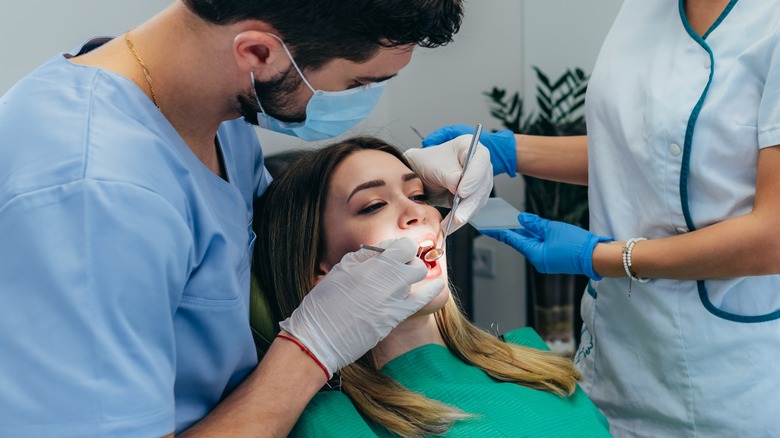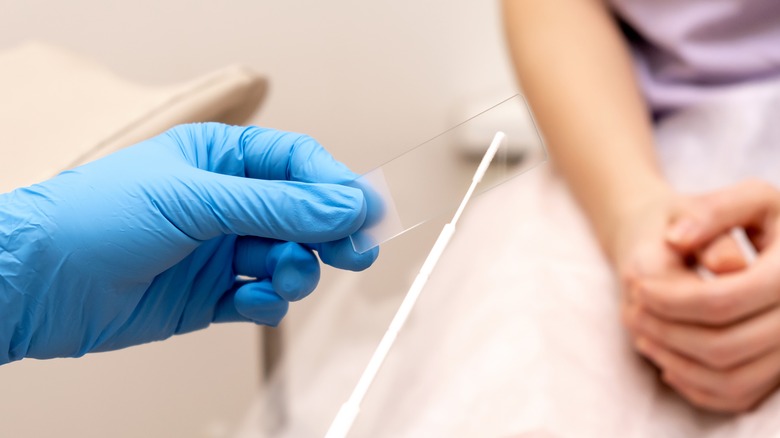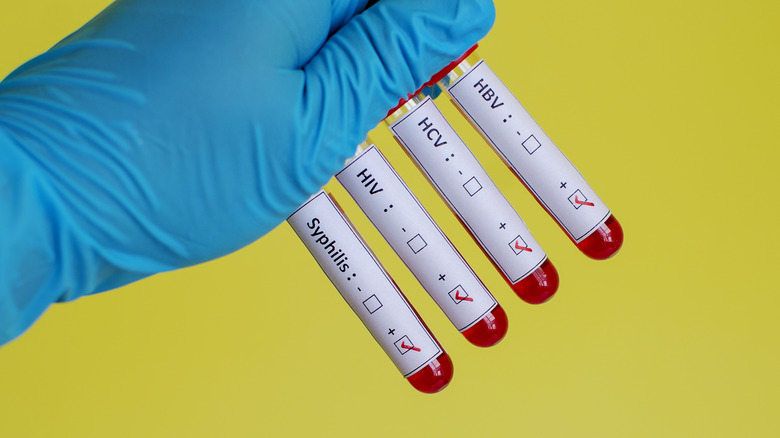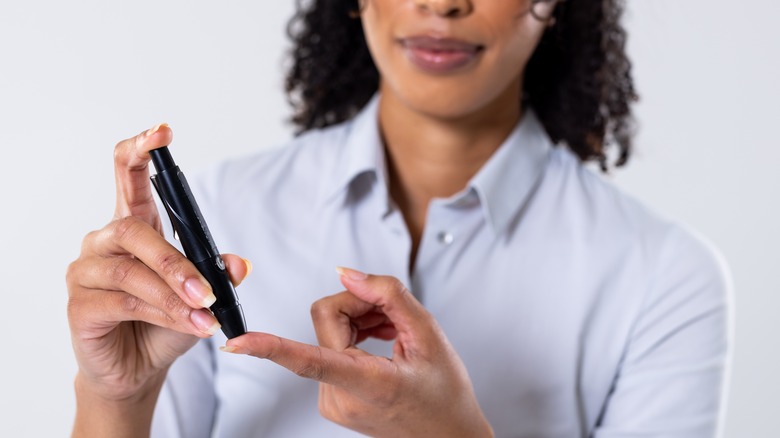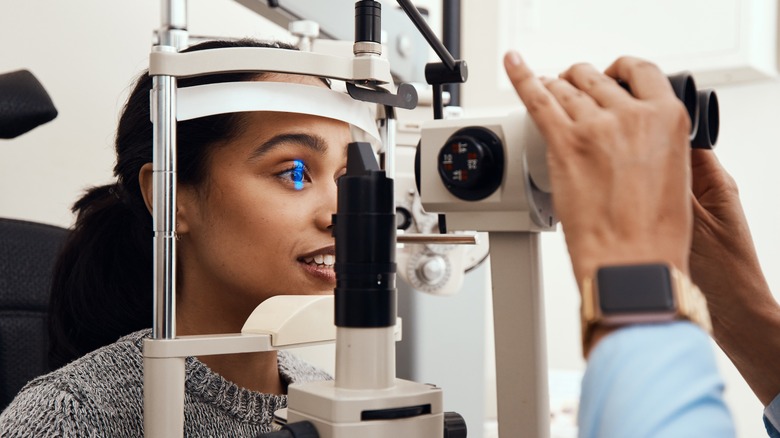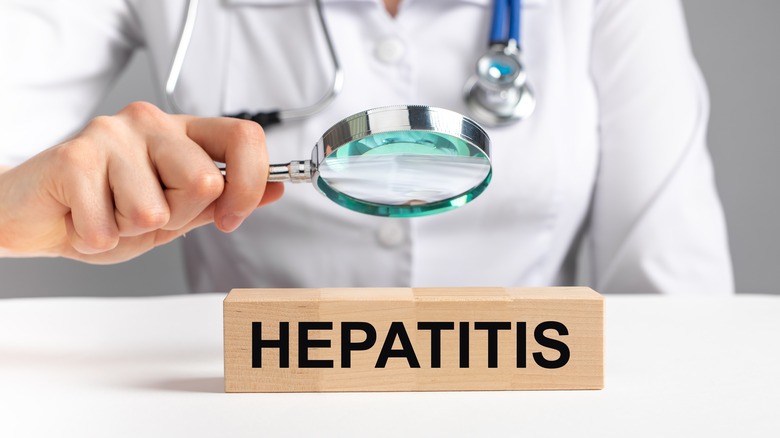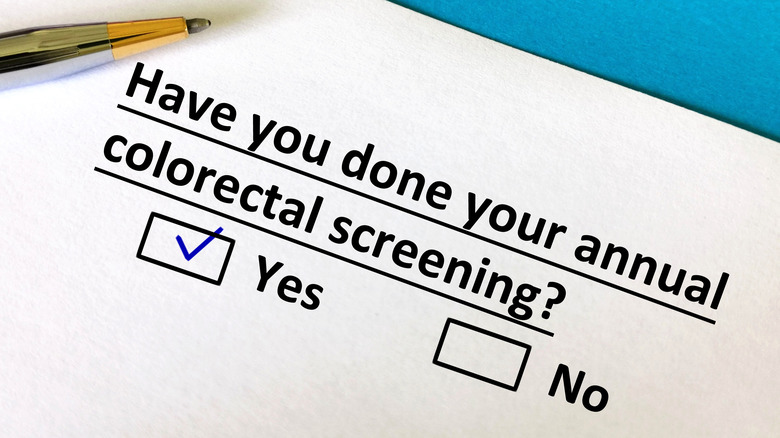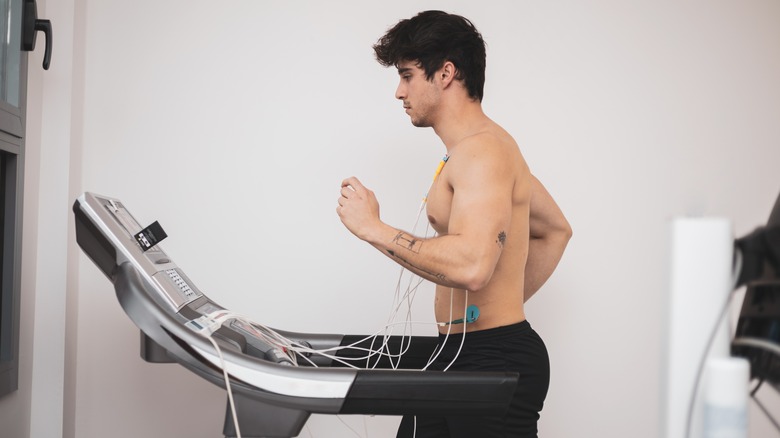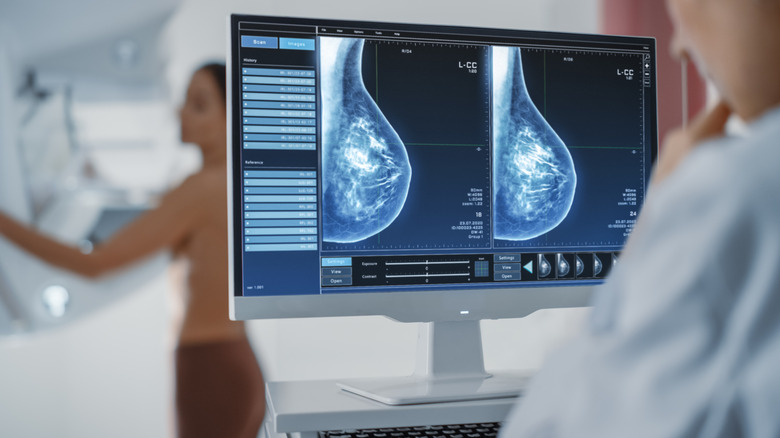Exams You Should Put On Your Calendar Once You've Hit 30
Visiting a doctor regularly can help you catch potential problems with your health early and let you know what changes you can make to be healthier now. Doctors typically suggest an annual visit for healthy adults to screen for common health issues, get updated on vaccines, and establish themselves with a healthcare provider so they have someone to go to if they do get sick or have a health concern.
People in their 30s will usually get a few things done at each annual visit. Your doctor will probably check your vital signs, like your body temperature, pulse, and blood pressure. They also might suggest routine bloodwork that checks cholesterol, blood counts, and blood glucose levels. These tests can pinpoint possible health issues that typically occur in your 30s. If you've had any abnormal results, your doctor might recommend more frequent visits or lab tests to keep an eye on everything.
While your annual visits cover your basic health needs, you may consider adding other screenings and exams to your routine once you reach your 30s.
Get your thyroid checked
The thyroid gland is responsible for several bodily processes, especially metabolism and development. It also plays a role in heart rate, body temperature, breathing, fertility, digestion, and more. Sometimes, the thyroid can become overactive or underactive, and either end of the spectrum can affect your overall health (via InformedHealth.org).
The American Thyroid Association recommends getting your thyroid checked beginning at age 35 and, if results fall within normal guidelines, every five years after. Women are more susceptible to thyroid disease than men, but it can still be a good idea for men to take part in regular thyroid screening when they're in their 30s.
Luckily, a routine thyroid test is nothing more than a blood test that checks the amount of thyroid hormones in the body. If you're experiencing rapid weight loss or gain, having trouble regulating your body temperature, or are seeing changes in your heart rate, consider talking to your doctor about thyroid screening (per Cleveland Clinic).
Go more in-depth with your dental exams
Dental exams typically start when your first teeth sprout in your mouth as a toddler and continue throughout adulthood. Visiting a dentist once or twice a year is a good rule of thumb for most people with good oral hygiene and dental health, but some people may need to visit more frequently if they tend to have more issues with their teeth.
No matter how often you visit, you may want to consider adding more in-depth exams to at least one visit per year once you turn 30. According to the CDC, over 47% of adults 30 and older have gum disease, also known as periodontal disease. Gum disease is caused by bacteria in the mouth that builds up and moves under the gum line, which can eventually make the gums pull away from the teeth and cause bone loss. If your dentist or hygienist spots signs of gum disease, they can do a deep cleaning to remove any tartar build-up beneath the gum line and recommend other treatments, if necessary, to slow or stop the progression of gum disease (via the CDC).
Women: don't forget to schedule those Pap tests
A Pap test, also known as a Pap smear, helps screen women for cervical cancer. Experts generally recommend that women get a Pap test every three years beginning when they turn 21. Then, when a woman turns 30, she should either continue getting a Pap test every three years, an HPV test every five years, or both tests every five years (via MedlinePlus).
According to the American Cancer Society, cervical cancer is most commonly diagnosed in women aged 35 to 44, making the 30s the prime age to screen for it. Since introducing the Pap test to routine exam schedules, the rate of cervical cancer dropped dramatically. So, adding a Pap to your exams when you turn 30 is a good idea, especially if you haven't had one before.
Although these exams can be uncomfortable, they are seldom painful, and they're over in just a few seconds. Planned Parenthood recommends staying as relaxed as possible, and breathing slowly and deeply to help you maintain a relaxed state during the test.
STI screening is a must for some
A sexually transmitted infection (STI) is an infection spread through sexual contact. STIs do not always require sexual intercourse to develop, as some can occur through any sexual contact where bodily fluids can exchange. HIV/AIDS, chlamydia, vaginitis, and HPV are all forms of STIs, but there are numerous STIs a person can develop (via Cleveland Clinic).
Whether you have one sexual partner or many, you can still be at risk for developing an STI. The CDC offers some recommendations for people in their 30s to screen for specific STIs. For example, women should screen for chlamydia and gonorrhea in their 30s and beyond if they're at an increased risk for those STIs, which may happen if they have more than one sexual partner or have recently changed sexual partners. Women in their 30s should also screen for HPV, which can cause cervical cancer. Additionally, the CDC recommends that women and men from 13-64 screen for HIV. Also, for all STIs, the CDC stresses the importance of regular screening for anyone who is at an increased risk, regardless of age or gender.
Get checked for diabetes
The U.S. Preventative Services Task Force recommends that all adults who are overweight or obese begin screening for prediabetes and diabetes beginning at age 35, even if they show no symptoms. Prediabetes is a condition noted by higher-than-average blood sugar levels. Although this condition hasn't turned to diabetes yet, it's a good indicator that you might develop it in the future. If your doctor finds that you have prediabetes, you may be able to make lifestyle and health choices to reverse the condition and possibly prevent type 2 diabetes.
To check for prediabetes or diabetes, your doctor will measure your blood sugar levels using a blood test. Some providers will check your fasting blood sugar level, which is the amount of sugar in your blood after not having anything to eat or drink for several hours. Others will test A1C, which measures blood sugar levels in the body over a few months. An A1C below 5.7% is normal, while 6.5% or higher indicates diabetes. A number in between pinpoints prediabetes (per the CDC).
Have your vision evaluated
The American Academy of Opthalmology (AAO) recommends that all adults have a full vision screening at age 40, even if they do not notice any problems with their eyes. A comprehensive vision screening can detect signs of vision problems and some eye-related diseases, and catching them by 40 could help you stay on top of your overall eye health.
However, the AAO also highly recommends that people with certain risk factors for eye disease have eye checks in their 30s rather than waiting until their 40s. People in this group include those with diabetes, high blood pressure, or a family history of eye disease.
No matter your age, it can be a good idea to get your eyes checked once a year, just for overall eye health. Regular vision screenings can help determine whether you should be wearing glasses or contacts, or might need a prescription for dry eyes or allergy-related symptoms (per Penn Medicine).
Get a hepatitis C screening if you haven't had one yet
Hepatitis C is an infection affecting the liver that's transmitted through blood. Although some people do not have long-term effects from the infection, others can have more severe symptoms that affect them throughout their life. Early detection of hepatitis C is key for many people, and the best way to catch hepatitis C quickly is to screen for it (per the CDC).
The CDC recommends that most adults get at least one hepatitis C screening in their lifetime, but that pregnant women screen with each pregnancy. So, if you haven't been screened for the infection by the time you turn 30, it might be a good idea to add to your list of tests to discuss with your doctor. Additionally, anyone with risk factors for hepatitis C, such as those who use and share drug preparation equipment (like needles or syringes) or people who have undergone hemodialysis, should be screened more routinely.
Consider screening for colon cancer if you have a high risk
Most people do not need to begin screening for colon cancer until they reach age 45, according to the American Cancer Society. However, some people may have a higher-than-average risk of developing colon cancer, and early detection may be helpful in these cases.
At-risk people should consider screening earlier than 45 for colon cancer, and may have more frequent testing than those with an average risk for the disease. If you have a family history of colon cancer or a personal history of colon polyps or inflammatory bowel disease, your doctor may recommend that you begin screening in your 30s.
Depending on how high your healthcare provider determines your risk for colon cancer, you may be able to screen with just a stool-based test that checks the stool for signs of cancer. However, some professionals may recommend a colonoscopy, which offers a visual examination of the colon to better detect potential issues.
Get your cholesterol checked if you have risk factors
Cholesterol is a substance that can cause clogged arteries when too much of it exists in the body. The body needs some cholesterol, but there are kinds that are considered better than others, known as high-density lipoprotein (HDL). Low-density lipoprotein (LDL) is considered the bad kind that builds up in arteries and can lead to heart disease (per the CDC).
The general recommendation to begin screening for cholesterol problems is age 45, but some people may need to begin as early as 20. Those at higher risk for high cholesterol include people with diabetes, high blood pressure, heart disease, or have a family history of heart problems. A cholesterol screening checks the blood for overall cholesterol levels plus both HDL and LDL to give your provider an idea of your whole cholesterol picture. People with in-range cholesterol levels may not need to have another test for about five years (per MedlinePlus).
Heart screenings are even more important in your 30s
Both men and women can develop heart disease or have heart attacks. However, these typically occur in men at an earlier age than women (via the National Library of Medicine). That's why men may get recommendations from their doctors to begin screening for potential heart problems as early as their 30s. In addition to the usual blood pressure, pulse, and other vital sign checks your doctor does at your annual visits, they might also suggest that men have an electrocardiogram (EKG) once they hit the 30 mark (per OhioHealth).
An EKG is a test that measures the heart's overall function. When you have one, you'll have several sensors attached to your chest area. The sensors pick up information about the heart, like how many times it beats, how well blood and oxygen move to the heart, and whether you may have experienced a heart attack. Some doctors may also suggest a stress test, which uses the EKG monitoring system to check the heart as you exercise, usually by running on a treadmill. This test can further determine how your heart handles stress.
Women at risk for breast cancer should start screening now
Breast cancer is one of the most common cancers women get, with over 297,000 diagnoses expected to be given this year alone (per the American Cancer Society). Although breast cancer is most likely to be diagnosed later in life, women in their 40s and younger can still get it, which is why it's incredibly important to screen early if you have any potential risk factors for the disease.
When breast cancer is caught in its earlier stages, a person with it has a better chance of surviving. While most women begin annual screenings for breast cancer at age 45, those with a high risk of the condition should start screening at age 30. Screening for breast cancer involves a mammogram, a test that x-rays the breasts to check for cancer. Both 2D and 3D mammograms are available at many centers, and your doctor can help you determine which one is right for you (via the American Cancer Society).
Start getting thorough skin exams
More people will get diagnosed with skin cancer in the United States than any other type of cancer. Routine checks of the skin are necessary for detecting any moles or lesions that could turn to cancer or may already be cancerous. Most people can benefit from having a full-body skin check at least once every year, during which a dermatologist checks all areas of the skin, from your feet to your head, to identify potential problems. People with light skin, multiple moles, or skin that burns or freckles easily in the sun are especially susceptible to skin cancer (per the Dermatology Treatment and Research Center).
Ideally, skin checks with a dermatologist should start at age 18, according to MedlinePlus, so if you haven't had one by the time you're 30, it could be a good time to start. However, it's also important to complete regular self-checks. Keeping an eye on your own skin can help you notice any changes in your moles that you can bring up to your dermatologist.
Make sure your liver works like it should
The liver helps filter the blood by moving out waste, metabolizing the nutrients the body needs, and preventing blood clotting. It also helps produce necessary nutrients like proteins and cholesterol. Although it doesn't get talked about much, the liver is one important organ that needs to be taken care of. Still, the liver naturally deteriorates with age, making it not as efficient at doing its job (via ScienceDirect).
So, don't be alarmed if your doctor suggests that you have a liver function test when you turn 30. There are no hard-and-fast rules for when to start getting liver screenings, and some healthcare providers prefer screening regularly as part of your annual checks. However, people with any symptoms of liver disease, like diarrhea, nausea, vomiting, fatigue, or jaundice, should definitely get checked. A liver function test is checked with a blood draw that tests levels of bilirubin, total protein, albumin, and other liver-related substances (via MedlinePlus).
Check your mental health, too
Of course, your physical health is crucial to your overall being. It's your physician's job to emphasize your physical health by screening for any problems that affect your physical body. However, mental health is equally important, even if it isn't always as obvious as physical problems. That's why you might notice that during your annual appointments, your healthcare provider asks you questions relating to your mental health, like whether you have any feelings of hopelessness or how you've been sleeping.
These questions are known as mental health screening. Although the questions may sometimes feel invasive, your answers can help your healthcare provider ensure that your mental health needs are also being met. Even your pediatrician may have screened you well before you turned 30. If your provider notices any concerns based on your answers, they'll discuss them with you and may suggest some activities to try, therapy, or further screenings to get you the help you need. If you don't want to wait for your next appointment with your doctor, you can also schedule an appointment with a social worker, psychologist, therapist, or psychiatrist to talk to a professional about your mental health concerns.



